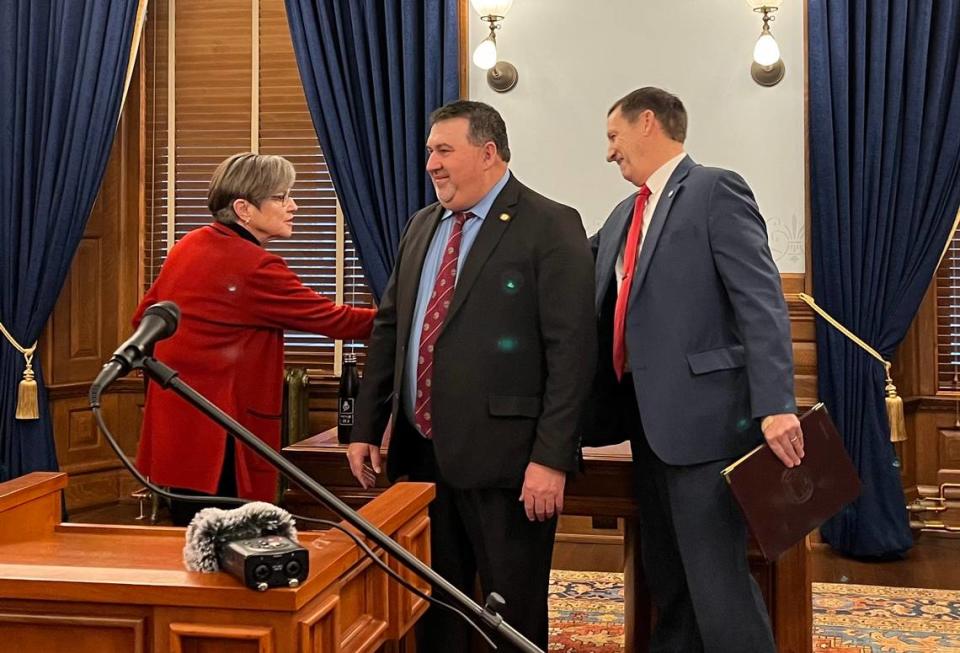KS Republicans move to tighten ballot access after losing voters to independent campaigns
- Oops!Something went wrong.Please try again later.
A little more than 20,000 Kansans voted for Sen. Dennis Pyle, a Hiawatha conservative, in his 2022 independent campaign for governor.
Kansas lawmakers want any future independent candidate to get the same number of people to sign a petition just to qualify for the ballot.
The Kansas House voted 68-52 on Thursday to raise the threshold for independent candidates seeking state office from 5,000 petition signatures to 2% of the turnout in the previous cycle’s gubernatorial election – just above 20,000 currently.
The move, which will make gaining ballot access much more difficult for independents, comes after two consecutive elections where Republicans blamed their loss in the governor’s race on an independent candidate. They argued in 2018 and 2022 that independents took away votes that should have gone to the GOP candidate.
“Any credible and serious independent candidate should be able to collect the signatures required in this bill,” Rep. Les Mason, a McPherson Republican, said during a House debate on the bill Wednesday.
“And that’s the goal: to make sure that the independent candidate is serious and credible, not motivated by ego or personal vendetta or just wanting to regale their grandkids someday with tales of how they ran for governor.”
Pyle said he views the proposal as evidence that Republicans fear an independent voice.
“I think it’s driven out of fear,” Pyle said. “They’re fearful of an independent voice and we need more independent voices. It’s more control by the establishment.”
Rep. Paul Waggoner, a Hutchinson Republican, said the 2% threshold was chosen because it’s similar to the proportion of votes needed for independent state legislative candidates and or for recognition of a political party. However, he acknowledged Pyle’s candidacy was fresh in lawmakers minds as they contemplated the bill.
“There’s very much a logic to what we did, I think anybody can see that,” he said. “It’s not to say Pyle couldn’t have done it, it just makes it so you’d have to have a little broader measure of support.”
Rep. Brandon Woodard, a Lenexa Democrat, said on the House floor that he is torn about the bill, which he said felt “retaliatory.” Speaking to The Star later in the day, he said the new threshold wouldn’t be impossible for candidates ”but does create an additional carrier to prevent an independent candidate from running.”
If the legislation passes, Kansas would have among the highest bar for independent candidates running for state office as a percentage of the population – Indiana and Wyoming already require 2% of a prior year’s turnout. It would place the same burden on independent candidates to reach the ballot as it does for a third political party to gain recognition.
Patrick Miller, a Kent State University political scientist who spent years at the University of Kansas, said candidates will still be able to get on the ballot under the new threshold. But the argument that the threshold would produce more qualified candidates, he said, was “convenient sounding nonsense” and that the result would instead be candidates with more resources.
In Kansas independent or third-party candidates have been a consistent presence in recent history. Keen Umbehr, a Libertarian, earned 4% of the vote in the 2014 race between Republican Gov. Sam Brownback and Democrat Paul Davis. Independent businessman Greg Orman earned about 7% of the vote in 2018 in the race between Kelly and then-Kansas Secretary of State Kris Kobach.
And Pyle pulled 2% of the vote in 2022 when then-Kansas Attorney General Derek Schmidt ran against Kelly.
Republicans have long blamed Orman and Pyle for Kelly’s victories, even though Pyle’s votes combined with Schmidt’s still would have been fewer than Kelly’s and, Miller said, polling indicated Orman’s voters preferred Kelly over Kobach.
An increased threshold may substantially change those dynamics.
Orman and Sen. Rick Kloos, a Topeka Republican who also ran as an independent in 2018, both said the 5,000 vote threshold was already difficult to reach. Orman described months of work by himself, volunteers and paid staff to get enough signatures so they could still be guaranteed ballot access even if hundreds or thousands of signatures were thrown out.
Orman, whose campaign in part hinged on his status as a successful businessman, said he would have had the resources to reach 20,000. But he said many candidates wouldn’t have those same resources and would be unable to run for office.
“Every time partisans in this state face an electoral challenge that they think leads to an outcome they don’t want they don’t look inward,” Orman said. “They say how do we rig the rules to make it harder for people to run for office.”
The Star’s Jenna Barackman contributed to this report


